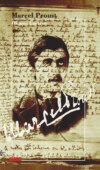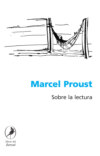Kitabı oku: «In Search Of Lost Time. Volumes 1 to 7», sayfa 42
The sense of comfort that I drew from the probability of my now being able to meet the little band whenever I chose was all the more precious to me because I should not have been able to keep watch for them during the next few days, which would be taken up with preparations for Saint-Loup’s departure. My grandmother was anxious to offer my friend some proof of her gratitude for all the kindnesses that he had shewn to her and myself. I told her that he was a great admirer of Proudhon, and this put it into her head to send for a collection of autograph letters by that philosopher which she had once bought; Saint-Loup came to her room to look at them on the day of their arrival, which was also his last day at Balbec. He read them eagerly, fingering each page with reverence, trying to get the sentences by heart; and then, rising from the table, was beginning to apologise to my grandmother for having stayed so long, when he heard her say: “No, no; take them with you; they are for you to keep; that was why I sent for them, to give them to you.”
He was overpowered by a joy which he could no more control than we can a physical condition that arises without the intervention of our will. He blushed scarlet as a child who has just been whipped, and my grandmother was a great deal more touched to see all the efforts that he was making (without success) to control the joy that convulsed him than she would have been to hear any words of thanks that he could have uttered. But he, fearing that he had failed to shew his gratitude properly, begged me to make his excuses to her again, next day, leaning from the window of the little train of the local railway company which was to take him back to his regiment. The distance was, as a matter of fact, nothing. He had thought of going, as he had frequently done that summer, when he was to return the same evening and was not encumbered with luggage, by road. But this time he would have had, anyhow, to put all his heavy luggage in the train. And he found it simpler to take the train himself also, following the advice of the manager who, on being consulted, replied that “Carriage or train, it was more or less equivocal.” He meant us to understand that they were equivalent (in fact, very much what Françoise would have expressed as “coming to as near as made no difference”). “Very well,” Saint-Loup had decided, “I will take the ‘little crawler.’” I should have taken it too, had I not been tired, and gone with my friend to Doncières; failing this I kept on promising, all the time that we waited in the Balbec station—the time, that is to say, which the driver of the little train spent in waiting for unpunctual friends, without whom he refused to start, and also in seeking some refreshment for himself—to go over there and see him several times a week. As Bloch had come to the station also—much to Saint-Loup’s disgust—the latter, seeing that our companion could hear him begging me to come to luncheon, to dinner, to stay altogether at Doncières, finally turned to him and, in the most forbidding tone, intended to counteract the forced civility of the invitation and to prevent Bloch from taking it seriously: “If you ever happen to be passing through Doncières any afternoon when I am off duty, you might ask for me at the barracks; but I hardly ever am off duty.” Perhaps, also, Robert feared lest, if left to myself, I might not come, and, thinking that I was more intimate with Bloch than I made out, was providing me in this way with a travelling companion, one who would urge me on.
I was afraid that this tone, this way of inviting a person while warning him not to come, might have wounded Bloch, and felt that Saint-Loup would have done better, saying nothing. But I was mistaken, for after the train had gone, while we were walking back together as far as the crossroads at which we should have to part, one road going to the hotel, the other to the Blochs’ villa, he never ceased from asking me on what day we should go to Doncières, for after “all the civilities that Saint-Loup had shewn” him, it would be ‘too unmannerly’ on his part not to accept the invitation. I was glad that he had not noticed, or was so little displeased as to wish to let it be thought that he had not noticed on how far from pressing, how barely polite a note the invitation had been sounded. At the same time I should have liked Bloch, for his own sake, to refrain from making a fool of himself by going over at once to Doncières. But I dared not offer a piece of advice which could only have offended him by hinting that Saint-Loup had been less pressing than himself impressed. He was a great deal too ready to respond, and even if all his faults of this nature were atoned for by remarkable qualities which others, with more reserve than he, would not possess, he carried indiscretion to a pitch that was almost maddening. The week must not, to hear him speak, pass without our going to Doncières (he said ‘our’ for I think that he counted to some extent on my presence there as an excuse for his own). All the way home, opposite the gymnasium, in its grove of trees, opposite the lawn-tennis courts, the mayor’s office, the shell-fish stall, he stopped me, imploring me to fix a day, and, as I did not, left me in a towering rage, saying: “As your lordship pleases. For my part, I’m obliged to go since he has invited me.”
Saint-Loup was still so much afraid of not having thanked my grandmother properly that he charged me once again to express his gratitude to her a day or two later in a letter I received from him from the town in which he was quartered, a town which seemed, on the envelope where the post-mark had stamped its name, to be hastening to me across country, to tell me that within its walls, in the Louis XVI cavalry barracks, he was thinking of me. The paper was embossed with the arms of Marsantes, in which I could make out a lion, surmounted by a coronet formed by the cap of a Peer of France.
“After a journey which,” he wrote, “passed pleasantly enough, with a book I bought at the station, by Arvède Barine (a Russian author, I fancy; it seemed to me remarkably well written for a foreigner, but you shall give me your critical opinion, you are bound to know all about it, you fount of knowledge who have read everything), here I am again in the thick of this debased existence, where, alas, I feel a sad exile, not having here what I had to leave at Balbec; this life in which I cannot discover one affectionate memory, any intellectual attraction; an environment on which you would probably look with contempt—and yet it has a certain charm. Everything seems to have changed since I was last here, for in the interval one of the most important periods in my life, that from which our friendship dates, has begun. I hope that it may never come to an end. I have spoken of our friendship, of you, to one person only, to the friend I told you of, who has just paid me a surprise visit here. She would like immensely to know you, and I feel that you would get on well together, for she too is extremely literary. I, on the other hand, to go over in my mind all our talk, to live over again those hours which I never shall forget, have shut myself off from my comrades, excellent fellows, but altogether incapable of understanding that sort of thing. This remembrance of moments spent with you I should almost have preferred, on my first day here, to call up for my own solitary enjoyment, without writing. But I was afraid lest you, with your subtle mind and ultra-sensitive heart, might, if you did not hear from me, needlessly torment yourself, if, that is to say, you still condescend to occupy your thoughts with this blunt trooper whom you will have a hard task to polish and refine, and make a little more subtle and worthier of your company.”
On the whole this letter, in its affectionate spirit, was not at all unlike those which, when I did not yet know Saint-Loup, I had imagined that he would write to me, in those daydreams from which the coldness of his first greeting had shaken me by bringing me face to face with an icy reality which was not, however, to endure. Once I had received this letter, whenever, at luncheon-time, the post was brought in, I could tell at once when it was from him that a letter came, for it had always that second face which a person assumes when he is absent, in the features of which (the characters of his script) there is no reason why we should not suppose that we are tracing an individual soul just as much as in the line of a nose or the inflexions of a voice.
I would now gladly remain at the table while it was being cleared, and, if it was not a moment at which the girls of the little band might be passing, it was no longer solely towards the sea that I would turn my eyes. Since I had seen such things depicted in water-colours by Elstir, I sought to find again in reality, I cherished, as though for their poetic beauty, the broken gestures of the knives still lying across one another, the swollen convexity of a discarded napkin upon which the sun would patch a scrap of yellow velvet, the half-empty glass which thus shewed to greater advantage the noble sweep of its curved sides, and, in the heart of its translucent crystal, clear as frozen daylight, a dreg of wine, dusky but sparkling with reflected lights, the displacement of solid objects, the transmutation of liquids by the effect of light and shade, the shifting colour of the plums which passed from green to blue and from blue to golden yellow in the half-plundered dish, the chairs, like a group of old ladies, that came twice daily to take their places round the white cloth spread on the table as on an altar at which were celebrated the rites of the palate, where in the hollows of oyster-shells a few drops of lustral water had gathered as in tiny holy water stoups of stone; I tried to find beauty there where I had never imagined before that it could exist, in the most ordinary things, in the profundities of ‘still life.’
When, some days after Saint-Loup’s departure, I had succeeded in persuading Elstir to give a small tea-party, at which I was to meet Albertine, that freshness of appearance, that smartness of attire, both (alas) fleeting, which were to be observed in me at the moment of my starting out from the Grand Hotel, and were due respectively to a longer rest than usual and to special pains over my toilet, I regretted my inability to reserve them (and also the credit accruing from Elstir’s friendship) for the captivation of some other, more interesting person; I regretted having to use them all up on the simple pleasure of making Albertine’s acquaintance. My brain assessed this pleasure at a very low value now that it was assured me. But, inside, my will did not for a moment share this illusion, that will which is the persevering and unalterable servant of our successive personalities; hiding itself in secret places, despised, downtrodden, untiringly faithful, toiling without intermission and with no thought for the variability of the self, its master, if only that master may never lack what he requires. Whereas at the moment when we are just about to start on a long-planned and eagerly awaited holiday, our brain, our nerves begin to ask themselves whether it is really worth all the trouble involved, the will, knowing that those lazy masters would at once begin to consider their journey the most wonderful experience, if it became impossible for them to take it, the will leaves them explaining their difficulties outside the station, multiplying their hesitations; but busies itself with taking the tickets and putting us into the carriage before the train starts. It is as invariable as brain and nerves are fickle, but as it is silent, gives no account of its actions, it seems almost non-existent; it is by its dogged determination that the other constituent parts of our personality are led, but without seeing it, while they distinguish clearly all their own uncertainties. My nerves and brain then started a discussion as to the real value of the pleasure that there would be in knowing Albertine, while I studied in the glass vain and perishable attractions which nerves and brain would have preserved intact for use on some other occasion. But my will would not let the hour pass at which I must start, and it was Elstir’s address that it called out to the driver. Brain and nerves were at liberty, now that the die was cast, to think this ‘a pity.’ If my will had given the man a different address, they would have been finely ‘sold.’
When I arrived at Elstir’s, a few minutes later, my first impression was that Mlle. Simonet was not in the studio. There was certainly a girl sitting there in a silk frock, bareheaded, but one whose marvellous hair, whose nose, meant nothing to me, in whom I did not recognise the human entity that I had formed out of a young cyclist strolling past, in a polo-cap, between myself and the sea. It was Albertine, nevertheless. But even when I knew it to be she, I gave her no thought. On entering any social gathering, when we are young, we lose consciousness of our old self, we become a different man, every drawing-room being a fresh universe, in which, coming under the sway of a new moral perspective, we fasten our attention, as if they were to matter to us for all time, on people, dances, card-tables, all of which we shall have forgotten by the morning. Obliged to follow, if I was to arrive at the goal of conversation with Albertine, a road in no way of my own planning, which first brought me to a halt at Elstir, passed by other groups of guests to whom I was presented, then along the table, at which I was offered, and ate, a strawberry tart or two, while I listened, motionless, to the music that was beginning in another part of the room, I found myself giving to these various incidents the same importance as to my introduction to Mlle. Simonet, an introduction which was now nothing more than one among several such incidents, having entirely forgotten that it had been, but a few minutes since, my sole object in coming there that day. But is it not ever thus in the bustle of daily life, with every true happiness, every great sorrow? In a room full of other people we receive from her whom we love the answer, propitious or fatal, which we have been awaiting for the last year. But we must go on talking, ideas come, one after another, forming a smooth surface which is pricked, at the very most, now and then by a dull throb from within of the memory, deep-rooted enough but of very slender growth, that misfortune has come upon us. If, instead of misfortune, it is happiness, it may be that not until many years have elapsed will we recall that the most important event in our sentimental life occurred without our having time to give it any prolonged attention, or even to become aware of it almost, at a social gathering, it may have been, to which we had gone solely in expectation of that event.
When Elstir asked me to come with him so that he might introduce me to Albertine, who was sitting a little farther down the room, I first of all finished eating a coffee éclair and, with a show of keen interest, asked an old gentleman whose acquaintance I had just made (and thought that I might, perhaps, offer him the rose in my buttonhole which he had admired) to tell me more about the old Norman fairs. This is not to say that the introduction which followed did not give me any pleasure, nor assume a definite importance in my eyes. But so far as the pleasure was concerned, I was not conscious of it, naturally, until some time later, when, once more in the hotel, and in my room alone, I had become myself again. Pleasure in this respect is like photography. What we take, in the presence of the beloved object, is merely a negative film; we develop it later, when we are at home, and have once again found at our disposal that inner darkroom, the entrance to which is barred to us so long as we are with other people.
If my consciousness of the pleasure it had brought me was thus retarded by a few hours, the importance of this introduction I felt immediately. At such moments of introduction, for all that we feel ourselves to have been suddenly enriched, to have been furnished with a pass that will admit us henceforward to pleasures which we have been pursuing for weeks past, but in vain, we realise only too clearly that this acquisition puts an end for us not merely to hours of toilsome search—a relief that could only fill us with joy—but also to the very existence of a certain person, her whom our imagination had wildly distorted, our anxious fear that we might never become known to her enlarged. At the moment when our name sounds on the lips of the person introducing us, especially if he amplifies it, as Elstir was now doing, with a flattering account of us—in that sacramental moment, as when in a fairy tale the magician commands a person suddenly to become someone else, she to whose presence we have been longing to attain vanishes; how could she remain the same when, for one thing—owing to the attention which the stranger is obliged to pay to the announcement of our name and the sight of our person—in the eyes that only yesterday were situated at an infinite distance (where we supposed that our eyes, wandering, uncontrolled, desperate, divergent, would never succeed in meeting them) the conscious gaze, the incommunicable thought which we have been seeking have been miraculously and quite simply replaced by our own image, painted in them as though behind the glass of a smiling mirror. If this incarnation of ourself in the person who seems to differ most from us is what does most to modify the appearance of the person to whom we have just been introduced, the form of that person still remains quite vague; and we are free to ask ourself whether she will turn out to be a god, a table or a basin. But, as nimble as the wax-modellers who will fashion a bust before our eyes in five minutes, the few words which the stranger is now going to say to us will substantiate her form, will give her something positive and final that will exclude all the hypotheses by which, a moment ago, our desire, our imagination were being tempted. Doubtless, even before her coming to this party, Albertine had ceased to be to me simply that sole phantom worthy to haunt our life which is what remains of a passing stranger, of whom we know nothing and have caught but the barest glimpse. Her relation to Mme. Bontemps had already restricted the scope of those marvellous hypotheses, by stopping one of the channels along which they might have spread. As I drew closer to the girl, and began to know her better, my knowledge of her underwent a process of subtraction, all the factors of imagination and desire giving place to a notion which was worth infinitely less, a notion to which, it must be admitted, there was added presently what was more or less the equivalent, in the domain of real life, of what joint stock companies give one, after paying interest on one’s capital, and call a bonus. Her name, her family connexions had been the original limit set to my suppositions. Her friendly greeting while, standing close beside her, I saw once again the tiny mole on her cheek, below her eye, marked another stage; last of all, I was surprised to hear her use the adverb ‘perfectly’ (in place of ‘quite’) of two people whom she mentioned, saying of one: “She is perfectly mad, but very nice for all that,” and of the other, “He is a perfectly common man, a perfect bore.” However little to be commended this use of ‘perfectly’ may be, it indicates a degree of civilisation and culture which I could never have imagined as having been attained by the bacchante with the bicycle, the frenzied muse of the golf-course. Nor did it mean that after this first transformation Albertine was not to change again for me, many times. The good and bad qualities which a person presents to us, exposed to view on the surface of his or her face, rearrange themselves in a totally different order if we approach them from another angle—just as, in a town, buildings that appear strung irregularly along a single line, from another aspect retire into a graduated distance, and their relative heights are altered. To begin with, Albertine now struck me as not implacable so much as almost frightened; she seemed to me rather respectably than ill bred, judging by the description, ‘bad style,’ ‘a comic manner’ which she applied to each in turn of the girls of whom I spoke to her; finally, she presented as a target for my line of sight a temple that was distinctly flushed and hardly attractive to the eye, and no longer the curious gaze which I had always connected with her until then. But this was merely a second impression and there were doubtless others through which I was successively to pass. Thus it can be only after one has recognised, not without having had to feel one’s way, the optical illusions of one’s first impression that one can arrive at an exact knowledge of another person, supposing such knowledge to be ever possible. But it is not; for while our original impression of him undergoes correction, the person himself, not being an inanimate object, changes in himself, we think that we have caught him, he moves, and, when we imagine that at last we are seeing him clearly, it is only the old impressions which we had already formed of him that we have succeeded in making clearer, when they no longer represent him.
And yet, whatever the inevitable disappointments that it must bring in its train, this movement towards what we have only half seen, what we have been free to dwell upon and imagine at our leisure, this movement is the only one that is wholesome for the senses, that whets the appetite. How dreary a monotony must pervade those people’s lives who, from indolence or timidity, drive in their carriages straight to the doors of friends whom they have got to know without having first dreamed of knowing them, without ever daring, on the way, to stop and examine what arouses their desire.
I returned home, my mind full of the party, the coffee éclair which I had finished eating before I let Elstir take me up to Albertine, the rose which I had given the old gentleman, all the details selected without our knowledge by the circumstances of the occasion, which compose in a special and quite fortuitous order the picture that we retain of a first meeting. But this picture, I had the impression that I was seeing it from a fresh point of view, a long way remote from myself, realising that it had not existed only for me, when some months later, to my great surprise, on my speaking to Albertine on the day on which I had first met her, she reminded me of the éclair, the flower that I had given away, all those things which I had supposed to have been—I will not say of importance only to myself but—perceived only by myself, and which I now found thus transcribed, in a version the existence of which I had never suspected, in the mind of Albertine. On this first day itself, when, on my return to the hotel, I was able to visualise the memory which I had brought away with me, I realised the consummate adroitness with which the sleight of hand had been performed, and how I had talked for a moment or two with a person who, thanks to the skill of the conjurer, without actually embodying anything of that other person whom I had for so long been following as she paced beside the sea, had been effectively substituted for her. I might, for that matter, have guessed as much in advance, since the girl of the beach was a fabrication invented by myself. In spite of which, as I had, in my conversations with Elstir, identified her with this other girl, I felt myself in honour bound to fulfil to the real the promises of love made to the imagined Albertine. We betroth ourselves by proxy, and think ourselves obliged, in the sequel, to marry the person who has intervened. Moreover, if there had disappeared, provisionally at any rate, from my life, an anguish that found adequate consolation in the memory of polite manners, of that expression ‘perfectly common’ and of the glowing temple, that memory awakened in me desire of another kind which, for all that it was placid and not at all painful, resembling rather brotherly love, might in the long run become fully as dangerous by making me feel at every moment a compelling need to kiss this new person, whose charming ways, shyness, unlooked-for accessibility, arrested the futile process of my imagination but gave birth to a sentimental gratitude. And then, since memory begins at once to record photographs independent of one another, eliminates every link, any kind of sequence from between the scenes portrayed in the collection which it exposes to our view, the most recent does not necessarily destroy or cancel those that came before. Confronted with the commonplace though appealing Albertine to whom I had spoken that afternoon, I still saw the other, mysterious Albertine outlined against the sea. These were now memories, that is to say pictures neither of which now seemed to me any more true than the other. But, to make an end of this first afternoon of my introduction to Albertine, when trying to recapture that little mole on her cheek, just under the eye, I remembered that, looking from Elstir’s window, when Albertine had gone by, I had seen the mole on her chin. In fact, whenever I saw her I noticed that she had a mole, but my inaccurate memory made it wander about the face of Albertine, fixing it now in one place, now in another.
Whatever my disappointment in finding in Mlle. Simonet a girl so little different from those that I knew already, just as my rude awakening when I saw Balbec Church did not prevent me from wishing still to go to Quimperlé, Pont-Aven and Venice, I comforted myself with the thought that through Albertine at any rate, even if she herself was not all that I had hoped, I might make the acquaintance of her comrades of the little band.
I thought at first that I should fail. As she was to be staying (and I too) for a long time still at Balbec, I had decided that the best thing was not to make my efforts to meet her too apparent, but to wait for an accidental encounter. But should this occur every day, even, it was greatly to be feared that she would confine herself to acknowledging my bow from a distance, and such meetings, repeated day after day throughout the whole season, would benefit me not at all.
Shortly after this, one morning when it had been raining and was almost cold, I was accosted on the ‘front’ by a girl wearing a close-fitting toque and carrying a muff, so different from the girl whom I had met at Elstir’s party that to recognise in her the same person seemed an operation beyond the power of the human mind; mine was, nevertheless, successful in performing it, but after a momentary surprise which did not, I think, escape Albertine’s notice. On the other hand, when I instinctively recalled the good breeding which had so impressed me before, she filled me with a converse astonishment by her rude tone and manners typical of the ‘little band.’ Apart from these, her temple had ceased to be the optical centre, on which the eye might comfortably rest, of her face, either because I was now on her other side, or because her toque hid it, or else possibly because its inflammation was not a constant thing. “What weather!” she began. “Really the perpetual summer of Balbec is all stuff and nonsense. You don’t go in for anything special here, do you? We don’t ever see you playing golf, or dancing at the Casino. You don’t ride, either. You must be bored stiff. You don’t find it too deadly, staying about on the beach all day? I see, you just bask in the sun like a lizard; you enjoy that. You must have plenty of time on your hands. I can see you’re not like me; I simply adore all sports. You weren’t at the Sogne races! We went in the ‘tram,’ and I can quite believe you don’t see the fun of going in an old ‘tin-pot’ like that. It took us two whole hours! I could have gone there and back three times on my bike.” I, who had been lost in admiration of Saint-Loup when he, in the most natural manner in the world, called the little local train the ‘crawler,’ because of the ceaseless windings of its line, was positively alarmed by the glibness with which Albertine spoke of the ‘tram,’ and called it a ‘tin-pot.’ I could feel her mastery of a form of speech in which I was afraid of her detecting and scorning my inferiority. And yet the full wealth of the synonyms that the little band possessed to denote this railway had not yet been revealed to me. In speaking, Albertine kept her head motionless, her nostrils closed, allowing only the corners of her lips to move. The result of this was a drawling, nasal sound, into the composition of which there entered perhaps a provincial descent, a juvenile affectation of British phlegm, the teaching of a foreign governess and a congestive hypertrophy of the mucus of the nose. This enunciation which, as it happened, soon disappeared when she knew people better, giving place to a natural girlish tone, might have been thought unpleasant. But it was peculiar to herself, and delighted me. Whenever I had gone for several days without seeing her, I would refresh my spirit by repeating to myself: “We don’t ever see you playing golf,” with the nasal intonation in which she had uttered the words, point blank, without moving a muscle of her face. And I thought then that there could be no one in the world so desirable.
We formed that morning one of those couples who dotted the ‘front’ here and there with their conjunction, their stopping together for time enough just to exchange a few words before breaking apart, each to resume separately his or her divergent stroll. I seized the opportunity, while she stood still, to look again and discover once and for all where exactly the little mole was placed. Then, just as a phrase of Vinteuil which had delighted me in the sonata, and which my recollection allowed to wander from the andante to the finale, until the day when, having the score in my hands, I was able to find it, and to fix it in my memory in its proper place, in the scherzo, so this mole, which I had visualised now on her cheek, now on her chin, came to rest for ever on her upper lip, just below her nose. In the same way, too, do we come with amazement upon lines that we know by heart in a poem in which we never dreamed that they were to be found.




















